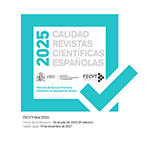Tunisian law against racial discrimination: social context and legal norm
Abstract
Among the debates that took place in Tunisia after the Aran Spring, racism was one of the issues that emerged most strongly in the public space due to the vulnerability of the country's black population and the sociopolitical discrimination that they have been suffering for decades. This complex social reality has also fueled the emergence of an important anti-racism movement that has vindicated many social demands and policies in favor of the country’s black minority, including effective legislation against racism. This paper is based on the hypothesis that the civil society’s activism that is the most committed to racial discrimination has led to the adoption of the Organic Law 2018-50 regarding the elimination of all forms of racial discrimination. An important text that, for the first time in the history of Tunisia, defines the notion of discrimination and establishes multiple criminal and preventive measures.
Downloads
Article download
License
In order to support the global exchange of knowledge, the journal Anaquel de Estudios Árabes is allowing unrestricted access to its content as from its publication in this electronic edition, and as such it is an open-access journal. The originals published in this journal are the property of the Complutense University of Madrid and any reproduction thereof in full or in part must cite the source. All content is distributed under a Creative Commons Attribution 4.0 use and distribution licence (CC BY 4.0). This circumstance must be expressly stated in these terms where necessary. You can view the summary and the complete legal text of the licence.










